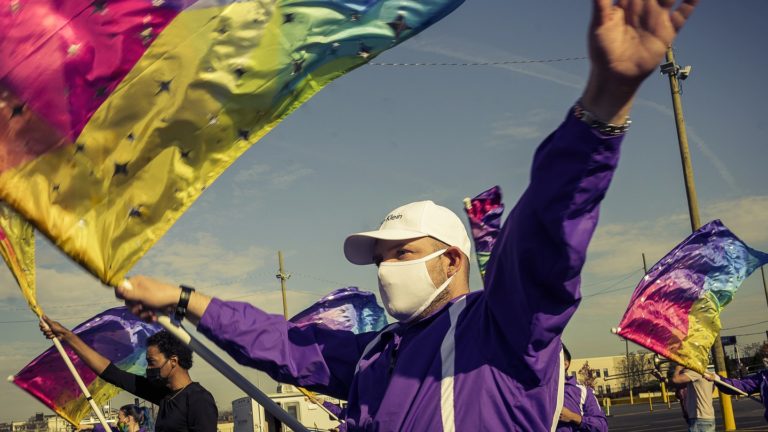

How the Lesbian & Gay Big Apple Corps prepared for the big parade
Photographs by Dina Litovsky
The Lesbian & Gay Big Apple Corps, one of the first queer marching bands in the United States, was founded in 1979 in New York City, a decade after the Stonewall uprising. This year, the Big Apple Corps reached what Marita Begley, the group’s director, called “the mountaintop”: Tomorrow, it will become the first openly LGBTQ group to perform in the Macy’s Thanksgiving Day Parade.
The band had to get creative in order to rehearse safely and legally this fall. Practicing indoors was out of the question, so its usual space in a Manhattan parish center would have to be traded for something without walls. The band needed daylight, so rehearsals would be limited to weekends. New York did not allow gatherings of more than 50 people, but more than 80 musicians and color-guard members and confetti-cannon shooters needed to practice, so organizers began to investigate their options in New Jersey. They soon settled on a parking lot in the Newark suburbs, between a soccer stadium and a PATH station.
My mom, who started playing piccolo in the band in 2019, drove in from eastern Long Island. Another piccolo player and a member of the color guard carpooled from Philadelphia. One couple schlepped a camper half an hour each way from Rahway, New Jersey, so their bandmates could use the bathroom.
For six sunny Saturdays in October and November, the members of the Big Apple Corps spaced themselves eight feet apart along the yellow lines of the parking spaces, covered the ends of their instruments with plastic, and played.
When we talked this week, Begley, who joined the band in the ’80s, recalled its early years. “We were quiet activists,” she said. “No one would invite ACT UP to their parade. But small towns were inviting the Lesbian & Gay Big Apple Corps to march in their Fourth of July parade.”
At those local processions, Begley said, she used to watch the faces of parents and grandparents in the crowd as they realized what the band stood for. Some spectators would give a thumbs-down. But others would stare for a moment, shrug, and keep on clapping. “It was almost subversive to use the most mom-and-apple-pie, all-American of mediums, the marching band, to open minds,” she said. “It really is.”